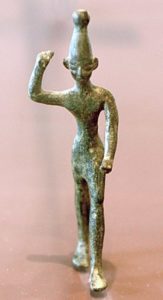A deep dive into the etymology (history and development) of the word idol:
According to the Oxford English Dictionary, the Greek eido’lon (Latin idolon) encompassed the notion of

image in many forms: phantom, idea, fancy, likeness. The Septuagint (Greek translation of the Old Testament, completed around 250 B. C.) appropriated the Greek word to refer to a carved representation, and that’s the usual sense in Hebrew. But the Hebrew word saw’, occasionally translated idol, means a falsehood, a vain thing, a “nothing.” An idol is, in the contemptuous Hebrew sense, “nothing,” and prophets like Isaiah had a lot of fun with the idea: cutting down a tree to carve it, cooking your food over the scraps, then bowing down to it (see Is. 44:12-17).
But an idolatrous “nothing” doesn’t seem like nothing to an idolater, and that’s the danger of it.
One intriguing use of the Greek applies the word to a reflection in water or a mirror. Other classical uses include an effigy, a counterfeit, an imitation, an insubstantial appearance (such as a shadow), a mental fiction or fantasy, a false conception. The wisdom of etymology subtly unfolds—who would have guessed this many shades of meaning for a word usually associated with crude images made from wood, metal, or stone?
 Take “reflection.” Aside from the myth that gives “narcissism” its name, this form of idolatry is a cartoon image, the smitten individual gazing at himself in a mirror while surrounded by fluttering hearts. We’re too sophisticated for that, or almost. I’m old enough to remember a video that made the rounds during the 2004 election: John Edwards, the Democrat candidate for V-P, taking 14 minutes to comb his hair in front of a mirror just before his one televised debate. (To be fair, he possessed exceptional hair.)
Take “reflection.” Aside from the myth that gives “narcissism” its name, this form of idolatry is a cartoon image, the smitten individual gazing at himself in a mirror while surrounded by fluttering hearts. We’re too sophisticated for that, or almost. I’m old enough to remember a video that made the rounds during the 2004 election: John Edwards, the Democrat candidate for V-P, taking 14 minutes to comb his hair in front of a mirror just before his one televised debate. (To be fair, he possessed exceptional hair.)
Most of us don’t fall in love with our reflections. But we do project, and the things we love become part of us, and when we pursue them, we pursue that which feeds, builds, expands, and often flatters us. It’s possible to fall in love objectively—that is, for the object itself. An aspiring ballerina loves dance for its own sake, as an athlete loves the game, a reader loves literature, a hiker loves mountains. But in time the temptation to identify with the object of our affection can overtake us. We no longer pursue out of love, but out of pride, possessiveness, or position. Get two or more enthusiasts together and clock how long before arguments break out. The more vehemence, the greater the personal investment.
When does enthusiasm become idolatry? That’s hard to say. When life makes no sense without it, when it brings pain—even when it dries up, suddenly and completely, because it couldn’t sustain your passion forever.
Idolatry is tricky, twisty, and deceptive. And ultimately, an illusion—a “nothing” after all. The only sure remedy is Reality Himself.


At Bible Study, we have been studying the book of Samuel. Samuel tells the Israelites to put away their idols. Strangely, what ensued in the class was a discussion about what “put away” meant. One woman insisted that it did not mean destroy but that they put them away for another time. Others, myself included, believed it meant destroy because it was the word Samuel used and it is also used to mean to “put away” one’s wife.
But the real concern is, what is my idol? Maybe not a statue, but what do I put in front of God? That is an uncomfortable question. You are so right. It is tricky and deceptive and just an illusion.
There is only one true God and I must worship Him only.